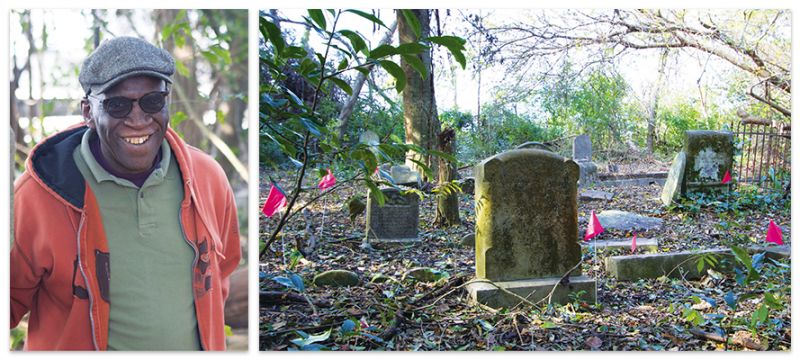The Gullah Society is dedicated to rescuing neglected African and African-American burial grounds

The Gullah Society is in the early stages of restoring burial grounds on the Upper Peninsula that “we believe have been overgrown since at least 1952,” says founder Dr. Ade Ofunniyin (left). Red flags mark graves, as well as items such as shells left behind by mourners.
If you ask Dr. Ade Ofunniyin what he’s been listening to these days, his answer might turn you on your ear. “These bones that just keep rattling, we’re now listening to them,” he says.
The Charleston native and anthropologist refers specifically to bones that have been found in recent years throughout the Lowcountry. They have lingered in neglected, centuries-old burial grounds—the final resting places of enslaved Africans and African Americans, as well as their descendents, the Gullah-Geechee people.
To preserve those grounds, in 2013, Ofunniyin founded The Gullah Society. As director of the nonprofit, Ofunniyin oversees the guardianship of all things Gullah-Geechee—from its dialect to its art to its very bones. This dovetails nicely with his job as an adjunct professor of African and African-American studies, as well as anthropology, at College of Charleston (CofC).
Ofunniyin—or “Dr. O” as he is called around campus—knows firsthand the heft of a heritage. He is a keeper of the legacy of his late grandfather, the venerated Charleston blacksmith Philip Simmons, whose distinctive and masterful ironwork is Charleston’s signature, scrolled calling card.

Gullah Society staffers use soft brushes to clean headstones, revealing the names of those buried; The organization mapped graves and advised parishioners on how to maintain them. They also conducted genealogical, archival, and oral history research.
He applies that same reverence to honoring burial grounds of the Lowcountry. In 2012, students in a CofC class that he created with Dr. James Ward mapped three cemeteries on Daniel Island, including one containing Ofunniyin’s own ancestors. It was this project—marking the location of each grave, connecting with family members of the deceased, and advising them on how to maintain the burial sites—that inspired Ofunniyin to establish The Gullah Society. “The bones are rattling and speaking truths, telling stories that need to finally be known,” he says.
The following year, at New First Missionary Baptist Church’s Sacred Burial Grounds on Edisto Island, the organization again mapped graves and advised parishioners on how to maintain them. They also conducted genealogical, archival, and oral-history research, filing their findings into a book they’ll present to the church this month. And their latest project is the biggest yet: on Monrovia Street, across from Pacific Box & Crate on the Upper Peninsula, sprawl four cemeteries, divided by I-26 and in bad disrepair. With support from the complex’s developer, Raven Cliff Co., and tech-firm tenant, Boomtown—as well as grant funds from Coastal Community Foundation—The Gullah Society is now in the preliminary stages of a massive rehab project.
“We’re clearing away overgrowth to create access to the tombstones and beginning some archeological work,” says Ofunniyin, who explains that it’s Gullah custom to leave seashells and treasured possessions on top of graves. “When we find these, we photograph them and mark them but do not remove them,” he explains.
In the coming months, the society hopes to see the fruits of its labor on another project—one involving grave sites dating to the 1700s that were unearthed in 2013 during renovation of the Gaillard Center. “We’ve been consulting with the City of Charleston on the reinterment of the remains at the Gaillard,” Ofunniyin notes. “Plans are underway for that to take place in 2018.”
And the story of those bones won’t end there. Through a research partnership between National Geographic Society and The Gullah Society, DNA analysis is being conducted on the remains. “This will allow us to determine where exactly those Africans came from and to possibly find their living relatives,” says Ofunniyin.